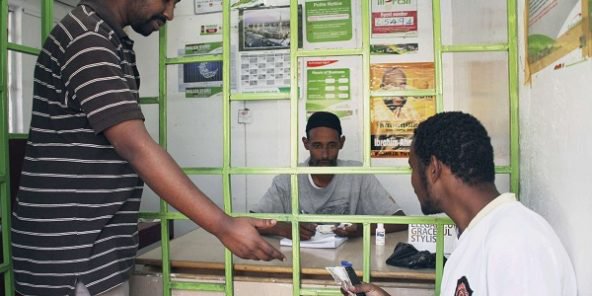Lors de la Conférence de l’Union africaine sur le e-commerce, qui s’est tenue à Nairobi cette semaine, l’UA a présenté sa feuille de route pour que le continent rattrape son retard dans l’économie digitale. Le marché du commerce digital en Afrique est en pleine expansion : estimé à 8 milliards de dollars (6,6 milliards d’euros) en 2014, il pourrait atteindre 75 milliards de dollars en 2025, selon le cabinet de conseil McKinsey.
Ces chiffres, révélés lors de la Conférence de l’Union africaine sur le e-commerce, qui s’est déroulée à Nairobi du 23 au 25 juillet sont pourtant faibles, en comparaison du volume du e-commerce mondial. Selon la Cnuced (Conférence des Nations Unies sur le commerce et le développement) – qui organisera d’ailleurs elle aussi un rendez-vous dédié au e-commerce africain, du 10 au 14 décembre prochain, à Nairobi – le e-commerce mondial a en effet atteint les 25 trillions de dollars en 2015 .
Pour le secrétaire général de la Cnuced, Mukhisa Kituyi, il y a donc urgence : « Les gouvernements vont devoir mettre la main à la pâte. L’Afrique a besoin d’efforts concertés pour ne pas rester à la traîne de l’ère de l’économie digitale », a-t-il déclaré en ouverture de la conférence à Nairobi.
Alors que le commerce intra-africain stagne à 18 % du commerce total du continent et que la part de l’Afrique dans le commerce mondial ne dépasse pas les 3 %, l’Union africaine voit dans le commerce digital la solution idéale pour développer les échanges. Mais les défis sont nombreux. État des lieux.
-
Consolider les infrastructures
De l’avis des participants, la fracture numérique et le manque d’infrastructures sont les freins principaux au développement de l’e-commerce sur le continent. L’Afrique a un taux de pénétration d’internet faible, oscillant entre moins de 20 % et plus de 60 % selon les pays. Même constat pour l’électricité : les coupures empêchent de capitaliser sur les technologies.
« Tout le monde parle des difficultés dans le crédit et le financement, mais le manque d’infrastructures de qualité et de logistique transfrontalière est le plus gros obstacle pour la vente, et en l’occurrence pour la vente en ligne » soupire Kwame Acheampong, directeur Afrique de la plateforme nigériane MallforAfrica, championne du commerce digital en Afrique. Pour pallier le manque de routes, de trains et de services de poste, MallforAfrica a noué un partenariat avec le groupe DHL, spécialisé dans le transport et la logistique.
-
Miser sur la formation
Le secteur privé se plaint du manque de professionnels qualifiés dans le secteur. « Même si la pénétration d’internet s’améliorait, les pays africains ne pourraient pas réellement en profiter à cause d’un manque de compétences » assure Karishma Banga, chercheuse à l’Overseas Development Institute (ODI).
« Il est donc extrêmement important de développer les compétences digitales avec une attention particulière aux STEM (sciences, technologies, éducation et mathématiques) ainsi qu’à l’enseignement technique et à la formation professionnelle. Il y a un besoin de sensibilisation pour que la demande des jeunes pour ce type de formation augmente », poursuit-elle. De son côté, la Cnuced appelle à « la restructuration d’un système éducatif aujourd’hui complètement déconnecté des besoins du marché ».
-
Soutenir et financer les start-up
Ces cinq dernières années, le niveau d’investissements étrangers, principalement venant des fonds de capitaux-risque, dans les entreprises technologiques et les plateformes d’e-commerce africaines a explosé.
« Il y a une dizaine d’années, le coût moyen d’un investissement pour une PME oscillait entre 50 000 et 500 000 euros. Aujourd’hui, on parle d’investissements de plusieurs millions d’euros pour des petits projets », explique Sid Boubekeur, consultant auprès de l’UA. La plateforme Jumia, aujourd’hui présente dans plus de vingt pays africains, mobilise des investissements allant jusqu’à 40 millions d’euros.
Les financements locaux restent cependant pratiquement inexistants. « Les gouvernements devraient mettre en place des politiques d’incitation à l’investissement privé, comme à Singapour où le gouvernement offre des allègements fiscaux aux investisseurs », suggère Kwame Acheampong.
Ibrahima Nour Eddine Diagne, président de l’African Performance Institute, appelle de son côté les gouvernements à soutenir directement les start-up locales : « le budget national peut, à travers la commande publique, aider les entreprises locales à se développer, même si le secteur privé a aujourd’hui son rôle à jouer pour améliorer la qualité des services et aider à leur numérisation » assure-t-il.
-
Harmoniser le cadre juridique
Malgré son retard, l’Union africaine est décidée à présenter une stratégie complète pour la régulation et l’organisation du e-commerce en Afrique d’ici à son sommet de 2020. Au programme de ce dernier, l’harmonisation des réglementations commerciales nationales et régionales, la mise en place d’une structure dédiée à l’économie digitale et la création d’un véritable marché numérique africain.


Leave a Reply